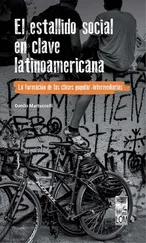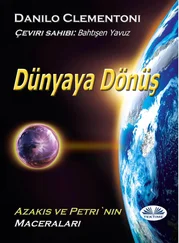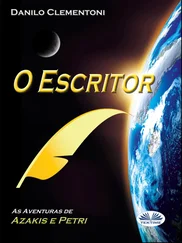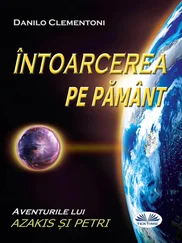Then Aunt Lela came to her assistance:
“Sweetheart,” she said, “how about you come out of that. . out of there. We’ll try to get you a passport. Or something.” Then she added, “Later on, of course. When things have calmed down, a little bit at least.”
“Oh, no,” said the doll-sleeper. “I’ll wait right here for the end of the war. I like it fine here. Really. This is great for me, Aunt Lela”; and Marija, astonished, disbelieving, looked at her face and her pale eyes: her head shrunken as with those prizes prepared by headhunters, no bigger than a fist; her mouth splitting her face in half, unchanged and so disproportionate in relation to her narrow, knotty nose and the delicate wax lines embossed on the doll-sleeper’s miniature face. Even her eyelashes were of a supernatural length and fell and rose with a sound like the scraping, loud and ungreased, of the wings of a night bird. Then Marija’s eyes stopped on Anijela’s necklace with its chunky artificial beads the color of amethyst; that necklace on the slender neck of the doll-sleeper gave Anijela the look of those mummies found in the pyramids of the Pharaohs: the dignity of a ruler’s death.
“That’s from my late mother,” Anijela said abruptly, before Marija could inquire about the significance of the necklace and before she could think of anything at all to say, at least anything other than what you would say to someone on their deathbed; “a family heirloom, as they say,” Anijela went on as if responding to Marija’s unspoken question and to her look that had now turned into a wild if suppressed cry. But then her eyes stopped on Anijela’s scrawny, withered fingers, with which she was picking at her necklace as if counting on her rosary; she still had long, well-groomed nails the color of dark silver that somehow, miraculously, matched the bleached-out amber of those long fingers, like a silver crown on the elegant, old-fashioned tube of a precious cigarette-holder.
“I use it as a calendar,” she said. “If each bead stands for one month, then there is more than three years’ worth here. I guess the war will be over by then. But a bead can also stand for a week. Or a day. Or an hour.” And she repeated: “I’m counting”; and Marija felt that she wouldn’t be able to say a word and that she would have to wait for the old man to put down his pipe for a moment or to mumble something, would have to wait for anything, and anything would do, so long as someone said something and she didn’t have to listen to Anijela’s hoarse whisper anymore, so long as someone said something in a human voice, even for the old man to clear his throat in deep bass tones, or for Aunt Lela, in her manly voice, reeking of cigarettes, to say something pointless or implausible, like that line a little while earlier about a passport for Anijela; but instead of any of that Marija was again forced to hear the whispering of the doll-sleeper: “And when I’m bored I play it a lot,” the mummy said, and her fingers the color of dark amber flew over the necklace, stopping for an instant when they seemed to have found the right note and chord, unregistered by her audience but that showed in her eyes across which scurried the skittish shadows of some unearthly melody (and now she remembered Polja’s figure wrapped around the rising neck of a cello beneath the black canopy of that hearse parked near the crematorium while dark rain trickled from the sky as they were returning to work, soaking wet and fatigued): “So there,” Anijela said then and moved her head back a little so that the point of her chin protruded upward as in those paintings of the descent from the Cross with their impossibly foreshortened perspective in which his toes, the hollow beneath his ribs, and his triangular chin align; “Tramtram-tram-tram,” Anijela conveyed to them the sounds that were crashing around in her mind but remained inaudible to them, all the while tapping her fingers on those glass beads the color of amethyst: “Mozart,” she said as if breathing out the word in a pause of a sixteenth note’s duration or between two half notes: “ Requiem ,” she said, without stopping her delirious finger movements, her head suspended over the imaginary piano: “I even know when I’m doing it wrong. I know exactly which note is which and as soon as I hit one I can hear it perfectly.”
And Marija had already opened her mouth to tell Aunt Lela that they had to go because she could no longer stand to listen to Anijela’s Requiem , but then the emergency sirens went off somewhere and took her breath away, but at that moment she would have preferred to hear the hysterical howling of a siren to Anijela’s whispering, and in the same moment she realized that they would have to stay for at least fifteen minutes more until the alarm passed. Fortunately Anijela fell asleep all of a sudden, as if lulled by her own music, and they, the three of them, that is to say Aunt Lela, the old man, and she, could talk about something in the indirect and silly way people usually talk; then the old man said that his common sense told him the war couldn’t last longer than a year because at that point God would either have taken pity on people or have destroyed the whole world with fire and flood, because he knew an old man in their area who up to now had prophesied about several wars and that included the exact day and month and year and he had even predicted the assassination in Sarajevo and had spoken about it in plain terms to everyone and for that reason he was thrown in prison and after it actually happened the way he had prognosticated (in the same way that he had prophesied about several droughts and even the date of birth and name of the heir to the throne) they let him go but first he had to tell them where he had obtained his knowledge of it and he let them know it was all written down, nice and tidy, in the Old Testament and in various books of prophecy; well, it’s this same old fellow who said this too, that this war cannot last for very long because how could it come to pass that people would hurl themselves into trenches this way like animals and pile up in heaps two dozen at a time and he remembered well what it had been like when he’d fought in a war under Emperor Franz Josef — but Marija was no longer listening to him she was already concentrating on this visit having to be over at some point and she was waiting for the siren to give the signal that the alarm was over and as she did that she looked into the candle so that she didn’t have to look into Anijela’s coffin anymore. Then after an eternity the siren screeched again and Aunt Lela said, “We don’t want to wake her. Let her rest”; and that was all Marija had been waiting for: by the time the old man closed the lid on Anijela’s coffin she was already in the next room and even all the way outside, where she had fled to escape herself and everything else, and then the man said:
“It wouldn’t be a bad thing for her to take a little rakija. It’s better than dust,” and Aunt Lela:
“To be sure. To be sure”; but Marija was already standing in the threshold by the door and staring into the clean, newly fallen snow as though at a miracle. Meanwhile now she was still standing, immobile, with her back squeezed up against the rod in the cabinet and with her head practically jammed into that stinking hospital coat until with one of her hands she pressed on her underwear and felt the blood coat her fingers and run down her leg, and she had the impression that she was going to bleed out like a butchered animal hanging from a hook, head down in a slaughterhouse while blood slowly drips and congeals on the concrete down below in a thick scarlet stain. It was obvious to her: she could do nothing; she would have to remain standing in this impossible position until something happened, until Dr. Nietzsche left or Jakob tried something; all she had to do was see to it that she didn’t pass out because to do so would betray her presence, and that she go on waiting there, her teeth clenched. She had already heard the doctor’s deep harsh voice that sometimes ended sentences in an unpleasant and unexpected falsetto and suddenly she realized that the light was burning again outside and that, therefore, the blown fuses had been fixed, for along the cabinet’s door a sharp fissure of light had appeared. That Maks had again managed to get away with it , she thought, and at the same time she heard Jakob’s voice too.
Читать дальше












